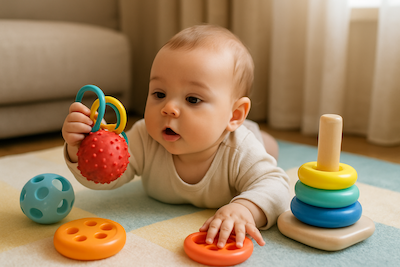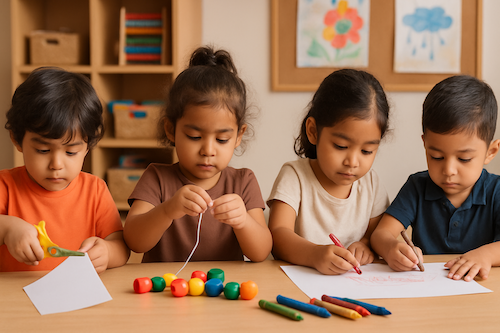Helping your child develop fine motor skills is important for your child. Children need to develop these skills for everyday tasks. Be it zipping the jacket, writing their name or even holding a glass, they need fine motor skills for it. It is a way to teach your child to build precision and strength in their hands, fingers, and wrists. In this article, we have laid out activities for different age groups, that you can do with your child to help them develop their fine motor skills through engaging activities.
What are Fine Motor Skills?
Fine motor skills are all about precise and small movements that your child makes using their hands, fingers, and wrists. A child needs coordination to hold something with their hand, wrist, and fingers. Anything like holding a button or a pencil will require proficiency. As your child engages in activities for fine motor skills, they will develop hand-eye coordination. Whether you are a teacher or a parent, these activities are great and will come in handy in making kids learn.
Best Fine Motor Skills Activities for Every Age
Here are some of the best fine motor skills for every age group, from infants to preschoolers. Each activity is a step to help them level up their skills and have fun while doing so.
Fine Motor Skills Activities Infants (0-12 months)
Even at this young age, children are ready to explore their surroundings with their little hands. Here are some activities for this age group to help them develop their fine motor skills for the first time.

- Catching Pom Poms: Place a few pom poms above their head in the cot, or around them and let them reach out and try picking up the pom poms. This will help them improve their grasping ability. Supervise them closely while they do so.
- Popping Bubbles: Kids love bubbles, blow some soap bubbles and let them reach out and pop them. This activity will help them improve their hand-eye coordination in a fun way.
- Water Play: Take a small dish of water, and give them a dropper. Let them squeeze the dropper and fill it with water. This will improve their coordination and also feeling the water will give them a sensory experience.
- Peeling and Placing Stickers: Use large stickers, and let your child peel and stick them on a piece of paper. This activity will help them learn grasping and hand control.
- Crumpling Paper: Give your baby a small piece of tissue paper to crumple. This activity is loved by children this age as it gives them a sensory feel too.
- Shaking Rattles: Let your baby hold and shake rattles in different ways. This will help them learn how to grip and the sound makes it fun for them too.
Fine Motor Skills Activities for Toddlers (1–3 years)
Toddlers love to explore with their hands as their curiosity is just beginning to grow at this age. They love exploring things around them and therefore, it is the perfect age to develop their fine motor skills.

- Drawing and Colouring: Give your child big-size, chunky crayons, let them draw and colour, and enhance their creativity, as they learn to gain control of their hand movements.
- Play Dough and Clay: Rolling and squeezing different colour play dough is not only fun but a great way to give strength to their little hands. You can teach them to cut the dough with cookie cutters to keep it fun.
- Finger Painting: Let them get messy, finger painting makes them use their fingers more than usual and gives them control and coordination. It’s an excellent sensory way to work on their motor skills.
- Buttoning and Zipping. Your baby may be too young to be able to button or zip a jacket, but letting them try is a good way to teach them coordination and develop their motor skills.
- Placing Coins in a Piggy Bank: Give your baby some coins to drop in a piggy bank, this activity will help them learn how to grasp a coin and improve their coordination too.
- Pasta Necklace: Let your toddler put some pasta through a string to make a necklace. This activity is fun and makes their hand-eye coordination and fine motor skills grow.
Fine Motor Skills Activities for Preschoolers (3-5 years)
Preschoolers are ready to challenge their hand-eye coordination and develop their creative thinking too. Here are some fun activities through which you can do so.

- Sorting Coins and Beads: Give your baby a mix of coins and beads and let them sort these as per size or colour, this activity helps them improve their focus along with their fine motor skills as they learn to handle small objects. Do this activity under supervision so that they don’t put anything in their mouths.
- Playing an Instrument: Give them an instrument like a baby guitar or a drum and let them play it, playing an instrument gives them a sense of rhythm and helps with hand-eye coordination.
- Tying Shoelaces: Tying shoelaces is a milestone skill. Try to teach them how to tie the laces with thicker laces first and then gradually move to finer laces. It is a rewarding way to improve their proficiency.
- Threading and Lacing: Let your little one put beads through a thick shoelace to create a string of beads. This activity will improve their focus and coordination.
- Paper Folding or Origami: Start with teaching them to fold larger sheets of paper, origami helps them improve their hand strength, patience, and focus.
- Writing letters and Numbers: At this age, preschoolers love to write, as it is something they have just started to learn how to do. Use thick crayons, or pencils to make it easier for them. Let them trace alphabets and numbers, this activity will prepare them directly for school.
- Creating Collages with Cutouts: Give your child a pair of child-friendly scissors. Let them cut pictures and make a collage out of the cutouts. Holding scissors strengthens their hands and develops a new skill of dealing with a scissor.
Developing your child’s fine motor skills does not have to be a complicated task. The activities mentioned in this article are designed in a way that your child learns while having fun and does not get bored. Some of these may require supervision, but most activities are such, that your child can do them independently once they get the hang of it. The activities will support your child’s growth in a very hands-on way. From infants exploring textures to preschoolers learning to cut and lace, these activities help your child grow and level up at every age, making them more confident and independent. Try them today.
Unlock Your Child’s Potential with KLAY Preschools and Daycare
Building fine motor skills is a cornerstone of early childhood development, and at KLAY Preschools and Daycare, we turn everyday play into meaningful learning. Our curriculum is packed with engaging activities like threading, clay modeling, scissor crafts, and sensory play—all designed to strengthen little fingers and spark creativity. With experienced educators guiding hands-on exploration, children master tasks like buttoning, drawing, and writing in a joyful, pressure-free environment. Whether it’s through puzzles, painting, or playful problem-solving, KLAY ensures your child develops the dexterity and confidence they need for school and beyond.
Ready to see how we blend fun with foundational growth? Come visit KLAY Preschool and Daycare and see firsthand how our innovative programs support your child’s growth and development. Book a tour today!
















Subscribe to our newsletter
[contact-form-7 id="12706" title="Newsletter Form for post page"]Our Related Blogs
Yoga Benefits, Activities, and Poses for Preschoolers
For preschoolers, yoga isn’t about perfection but about giggles and benefits. So, are you curious how a simple stretch can support a child’s focus, flexibility, and emotional well-being? Let’s roll...
Year-End Reflection and Goal Setting for Children
Parenting is a journey filled with the brightest moments and valuable lessons, both for us and our children. As the year draws to a close, it’s the perfect time to...
Work-Life Balance Solutions for Parents in Emerald Hills Rd, Sector 65, Gurugram: The KLAY Daycare Advantage
Finding the perfect balance between professional commitments and parenting is a challenge for many working families in Gurugram. Parents in Emerald Hills Rd, Sector 65, especially, look for childcare solutions...